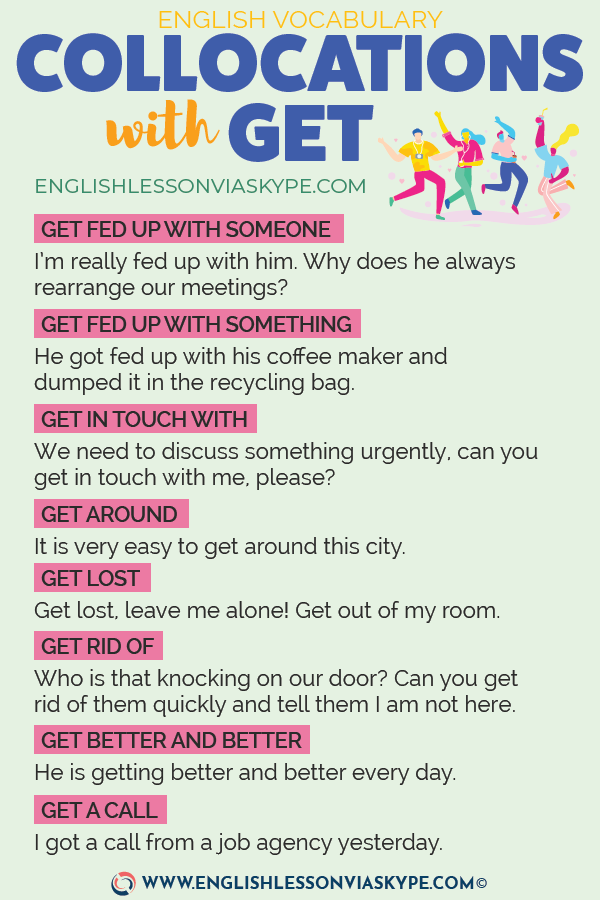Here we explore those English Expressions with GET.
TO GET is one of the many verbs in English that are useful and frequently used in many expressions.
Table of Contents
Harry
Useful Expressions with Get

get fed up with
We can get fed up with someone. To get fed up means to lose interest in or become annoyed with or frustrated with something or someone.
Example:
Ivan had a good friend Misha but from time to time Misha would annoy Ivan when he was constantly rearranging their meetings or worse still not showing up at all.
In this situation Ivan could say:
‘You know, I am really fed up with Misha. Why does he always change our time and why can he not tell me in advance if he is not going to turn up (arrive) at all?’
We can also get fed up with something. Perhaps an old electrical gadget is constantly breaking down.
Example:
David had a coffee maker that he got as a present many years ago. However, it wasn’t working properly and the coffee had a peculiar taste. He got fed up with it one day and dumped it in the recycling bag. Time for a new purchase!!
improve english on a budget
Online English Courses from €7.99
Collocations and Expressions with GET
get in touch with
To get in touch with somebody means to contact them, either by message, WhatsApp, email or by calling them on your mobile.
We can use it in various ways.
Can you get in touch with me urgently as we need to discuss …. – here it is a request from someone looking for immediate contact
or I was trying to get in touch with you as i am visiting your city and it is a long time since we met… – here an old friend colleague or relative would like to meet up when they are “in town” for a few days…
or I’ll get in touch with you in the next few days to confirm that meeting… – here a promise to follow up on an arrangement and confirm an appointment
Scroll down, there is more to come
get around
This has various options and uses. To get around can mean someone travels a lot.
Example:
Mary was asking John about his plans. He told her he had just returned from a trip to America and in the next few weeks he was going to Brazil, Turkey and the Lebanon.
‘Wow, you certainly get around, don’t you!’
or someone might use GET AROUND to ask if you did what you promised to do
Example:
Did you get around to calling the electrician yet? You know that light fitting needs fixing and you cannot do it.
Someone might also ask how do you usually get around in your city? – How do you travel in your city
get lost
This can be used in a few ways and varies depending on your stress and intonation. Quite simply to get lost means not able to identify where you are in a city or town.
Example:
I got lost last week in London. I got off the underground (metro) and didn’t know where I was.
Or if you place the emphasis on LOST and raise your voice it might be used to tell someone (not politely) to leave you alone.
Example:
Jacob shouted to his younger brother, ‘Get lost, leave me alone! Get out of my room!’
We can also get lost in a book or a movie we are reading or watching.
Example:
I had a wonderful night I really got lost in that book I bought last week. I cannot put it down (stop reading it).
book your trial English Lesson
get a/the message
Again, it can be used in several ways.
Did he finally get the message? – Did he finally realise? Did he understand the real meaning of what you are trying to tell him?
Example:
You have been trying for a long time to break off a relationship with a boyfriend. You stopped returning his calls, you stopped texting him and refused to meet him. After 10 days he finally got the message. (He finally understood the relationship was over).
or
Can you get a message to Daniel please? – a common request when you phone an office to talk to contact but he or she is not there. You ask the receptionist if they can tell the person that you will call again or you have to change the meeting etc.
Example:
Can you get a message to Daniel please and tell him that the delivery arrived.
5 more collocations with GET + useful phrases are below
Collocations and Expressions with Get

get the joke
Used positively or negatively. I got the joke but I didn’t find it funny or I didn’t get the joke what was he saying? To get the joke means to understand the story or the humour in the joke.
And I didn’t get the joke means you did understand the relevance or perhaps it was a joke specific to that town or city and not so easy for outsiders to understand
get back from
A little more specific which means you have recently returned from another location.
I got back from Rome last night it was fantastic.
Alternatively, it could be a question: When did you get back from Rome?
or When will you get back from Rome?
If we change the preposition FROM and use TO the meaning changes.
I will get back to you
means I will call you again or I will follow up on our conversation.
He promised to get back to me later in the day and let me know if I got the job.
Expressions with Get
get rid of
When something isn’t needed or wanted we try to throw it away or get rid of it.
Example:
Can you get rid of that empty wine bottle before my mother gets here? She will think we have been drinking all day.
A robber might want to get rid of the evidence (destroy) before the police start investigating the crime.
Who is that knocking on our door? Can you get rid of them (tell them to leave) quickly and tell them I am not here.
get into trouble
Usually, when we do something we shouldn’t have done we will get into trouble with someone.
Example:
Will you get into trouble with your parents (will they be annoyed) if you are late home?
Will you get into trouble (will you get a ticket or a parking fine) with the police for parking there it’s a no-parking zone?
Will you get into trouble with your boss (will he shout or complain about your timekeeping) for being late back from lunch?
There are many other expressions using GET. Here are some of them:
– I got a nice present for my birthday. The girls in the office bought it for me.
– I am getting older every time I look in the mirror.
– I got a call from a job agency yesterday. I have an interview on Wednesday.
– I get to work by bus every day.
– He is getting better and better every day. The medicine seems to be working.
– He is getting worse really. He has been late three times this week already.
You will love these English lessons
More Information
For more information in English Expressions, English Phrasal Verbs and English Grammar Rules, check ou the following links:
ENGLISH ADJECTIVES TO DESCRIBE JOBS
LESS WELL KNOWN PHRASAL VERBS WITH OFF
Intermediate English learners! Here is your chance to master English Grammar Tenses so you can speak English fluently and with confidence, sign up for 3 hour English Grammar Rules Refresher Course. Click on the link to read more.
I’ve also found get collocations on IELTS Buddy + online exercise.






